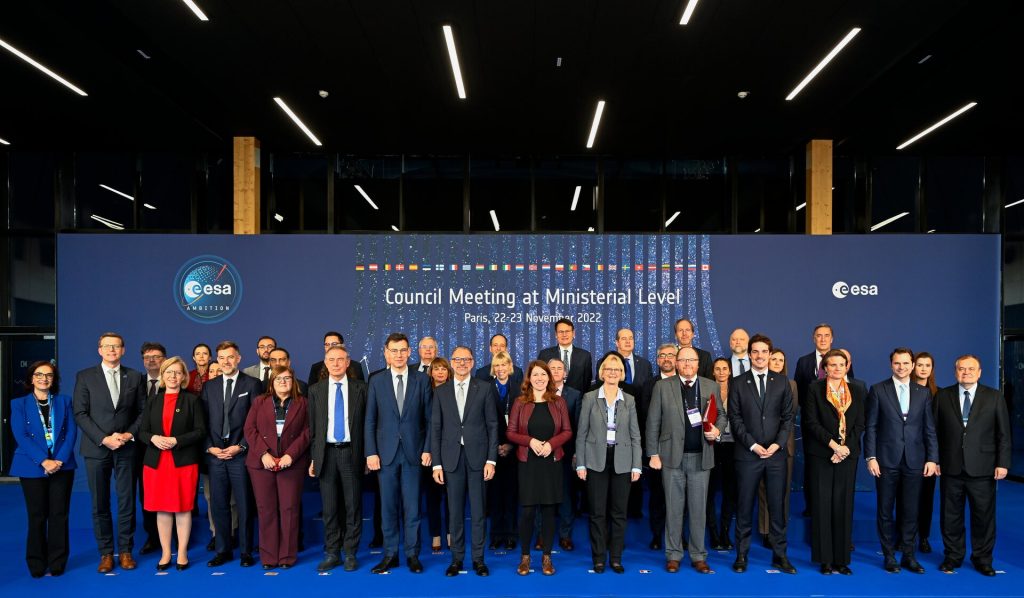The decision was taken at the ESA Council in Paris, and the ESA secured €16.8 billion funding (up from €14.4 billion in 2019), with the UK committing to contribute £1.84 billion.
ESA said it was working to ensure that “essential space-based services are secure, and that Earth’s orbital space is responsibly managed”.
Missions and programmes to benefit from the funding include the scientific programme Cosmic Vision, Voyage 2050, Juice and Euclid. Ministers also agreed to devote €2.7 billion to ESA’s Earth observation programme.
For example, Juice will explore Jupiter and its ocean-bearing icy moons to study where life may have formed elsewhere in the Solar System, and Euclid will map a large part of the Universe, observing billions of galaxies through ten billion years of cosmic time.
“When faced with economic hardship, it is important to invest wisely in industries that create jobs and prosperity in Europe,” said Josef Aschbacher, ESA Director General. Through this investment, we are building a Europe whose space agenda mirrors its political and future economic strength.”
“We are boosting space in Europe, kicking off a new era of ambition, determination, strength and pride. Climate and sustainability will remain ESA’s highest priority, our science and exploration will inspire the next generation, and we shall build a place where European space entrepreneurs thrive.”
From a UK perspective, the landmark includes the UK investing £315 million in Earth observation and climate programmes, a 45% increase, an ESA commitment to the UK-built Rosalind Franklin Mars Rover, which is set to launch to Mars in 2028, UK involvement in space sustainability, via satellite management, maintenance and retrieval, UK leadership of the Vigil space weather mission, which will travel to deep space known to investigate dangerous solar storms, and funding secured for further development of the TRUTHS mission, to improve the accuracy of climate measurements.
“I’m delighted to return from the meeting with such a strong package of commitments, as well as being able to provide support for our outstanding Earth observation sector, to protect it from the uncertainty caused as a result of the EU’s delays, as we continue seeking Copernicus association,” said UK Science, Research & Innovation Minister, George Freeman.
“These new investments will support the ongoing growth of the UK space and commercial satellite sector – creating new jobs around the UK from Cornwall to the North of Scotland – and securing UK leadership in space sustainability. They will put our scientists and engineers at the forefront of some of the world’s most important missions and programmes which drive transformational innovation.”
Specifically, in the words of the UK Space agency, £217 million will go towards exploration programmes, supporting robotic missions to Mars and contributing to the Artemis Moon programme, including the Argonaut (European Large Logistics Lander), Gateway space station and commercial lunar communications systems.
There will be £206 million for telecommunications programmes, building on the work of the European Centre for Space Applications and Telecommunications in Harwell, to enable faster 5G and future 6G connectivity, develop new optical and quantum communications systems, and support constellations of Low Earth Orbit satellites.
There will be £111 million to increase space safety and security, improving forecasting and building resilience to dangerous space weather, protecting critical national infrastructure, tackling the growing challenge of space debris and catalysing growth and further investment in high-potential areas including in-orbit satellite servicing and manufacturing
Finally, £71 million will back new technologies to reduce reliance on non-European nations for important electrical and electronic components, supporting emerging areas such as space-based solar power, and creating radioisotope heat and power systems derived from nuclear waste.
See also: ESA signs up for more space on smarter European roads

